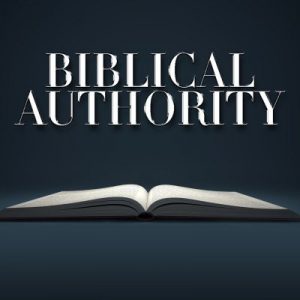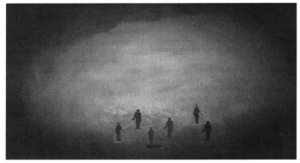===========================================
SEEKING THINGS ABOVE
“If then you were raised with Christ, seek those things which are above,
where Christ is, sitting at the right hand of God. “(Col. 3:1)
Volume II Number 1
April 2021
===========================================
Silence of the Preachers
Joe R. Price

Jeremiah was set in place by God to be His prophet to Jerusalem, Judah, and the nations. With God’s word, Jeremiah was set “to root out and to pull down, to destroy and to throw down, to build and to plant” (Jer. 1:4-5, 9-10). When he was severely persecuted for speaking God’s word to rebellious Jerusalem, Jeremiah pondered silence over speaking “anymore in His name” (Jer. 20:9). God’s prophet was tempted to refrain from speech, sure to bring him under rejection, mockery, imprisonment, and death threats. He did not yield to the temptation. Instead, he was emboldened in faith to continue to open his mouth and speak the inspired word of God: “But His word was in my heart like a burning fire shut up in my bones; I was weary of holding it back, and I could not” (Jer. 20:9). Although friends and foes were against him, he rested his confidence in the Lord’s presence, power, and justice (Jer. 20:10-12).
What a worthy example for every Christian today. We live in an age of moral defiance and open rebellion against God and His holy standards of conduct. Marriage is being redefined to include “same-sex” relationships. The murder of innocent life has been redefined to be a woman’s “right to choose” concerning “reproductive health,” while the unborn are relegated to being an appendage. Mind-altering substances like marijuana are being legalized, joining the ranks of alcohol and other drugs to vie for a way to “escape” reality. In religious circles, sin is being redefined out of existence and the Scriptures are ridiculed as mythical, outdated, and irrelevant. Faith has been reduced by some to a money grab as they preach prosperity theology that serves the flesh.
The question for us is whether we will raise our voices against the prevailing winds of sin and unbelief. Will we fear men and be silent? Will we quietly dissent but publicly go along with the evils of the day? Are we prepared to suffer for the name of Christ (1 Pet. 4:16)? What would Jeremiah say and do? (If you are familiar with the life of Jeremiah, you know the answer to that question.)
Jeremiah is a worthy example for gospel preachers to follow. Preachers have devoted their lives to proclaiming the word of God to a lost and dying world. They are obliged before God to “preach the gospel” without fear or favor (1 Cor. 9:16; 2 Tim. 4:2-4). They are to speak the whole counsel of God boldly, not avoid its proclamation (Acts 20:27). They are not to be hirelings who remain silent in the face of sin, error, and spiritual danger (Jno. 10:12-13).
Too often we are left to wonder what a preacher teaches on the soul-affecting topics of the day. Jeremiah didn’t have that problem; people knew where he stood. A gospel preacher must stand against the tide of public opinion and unfaithfulness like Jeremiah. That is not only true of gospel preachers, but also of elders, teachers, and all who do the work of building up the body of Christ (Eph. 4:11-16).
Preachers are silent today when they ought to proclaim God’s word against sin in all its forms, including false teaching and immorality. No preacher (or elder) should ever be heard saying, “We don’t have that problem here,” or, “there’s no need to preach on that subject.” That is exactly what our adversary the devil wants – the silence of the preachers! Be assured fellow-preachers, if you are not preaching on subjects because they are not problems currently where you live, they will eventually arise, and the brethren will be ill-equipped to address them from God’s word, due in part, to your silence (cf. Ezek. 3:16-19). Let me illustrate.
Bible authority and the local church. I have been told on more than one occasion that comprehensive teaching on how to establish and apply Bible authority is not being preached these days as in the past. Congregations are becoming ill-prepared to deal with innovations that are creeping into local churches. We now see “non-institutional” churches of Christ advertising the social activities of members, from picnics to youth “lock-ins.” By what Bible authority does a church advertise and promote recreational activities? Some churches of Christ announce youth camps operated by colleges and individuals. Where are the preachers rising up to warn brethren against violations of Bible authority by adding social work to the spiritual labors of the local church (Col. 3:17)? Fellow-preacher, when was the last time you preached on Bible authority and the differences between the individual and the congregation (1 Tim. 5:16; Matt. 18:15-17)? The silence of the preachers is deafening!
Marriage, divorce and remarriage. That’s a topic from which many preachers run. When was the last time your preacher publicly preached on divorce and remarriage? There are preachers who will not do so. They reason like the world: “That is a subject for classes or private study, not the pulpit.” Perhaps Jeremiah should not have publicly preached against the adultery of the age (both actual and the spiritual adultery of idolatry, Jer. 3). At times I am asked what a certain preacher teaches on this subject, and I must rely, “I don’t know; he has nothing in writing or on record to go to and find out.” That should not be the report concerning one who preaches the gospel (Acts 20:20). Ask the man what he believes and preaches. (Some appear to think we cannot even ask what a preacher preaches without intruding on church autonomy.) Ask your preacher to preach on the subject. Silence enables the spread of doubt, sin, and compromise. To add insult to injury, when one does speak up and preach the truth on the subject, he is branded a “radical,” a “troublemaker,” and an “extremist” unworthy of being heard (sort of like Jeremiah, Jer. 26; 37:11-21; 38:3-6). So, it is safer to be silent. The silence of the preachers is deafening!
Space fails to speak of the silence of the preachers on immodest clothing, social drinking, fellowship with error, and more. Jeremiah’s warning remains relevant: “The prophets prophesy falsely, and the priests rule by their own power; and My people love to have it so. But what will you do in the end” (Jer. 5:31)?
This is a high bar, and one I’m sure this preacher has not always met. Still, Jeremiah’s work exhorts us to improve as we aim to preach the whole counsel of God.
Is your preacher silent when he should preach (2 Tim. 4:2)? If so, ask him why, and help him improve. God’s word was like a fire burning in Jeremiah’s heart he could not contain; he had to preach. May it ever be so.
__________
Bible Authority 8
Direct Command
Mike Johnson

How do we establish Bible authority? It seems clear from the Scriptures that God intends for us to determine biblical authority in four ways. These are direct command, direct statement, approved apostolic example, and necessary inference. (Sometimes, direct command and direct statement are combined.) A broader classification of these forms of authority are: direct (command or statement) and indirect (approved apostolic example and necessary inference). In this study, we will consider the Direct Command.
The basic definition of the word command is “to give directions or orders authoritatively.” Commands can be either positive or negative. It may be “Do this,” or it may be “Don’t do that.” The Ten Commandments found in Exodus 20 illustrate this principle. Of the Ten Commandments, eight are negative (Thou shalt not), and two are positive (Thou shalt).
We must understand that not every command found in the Scriptures is applicable today. Consider a few Old Testament examples. God told Adam and Eve (Gen. 2:16-17), for instance, that they were not to eat of the tree of knowledge of good and evil. He intended this command to be only for them and to no one else. While there are lessons to learn from this commandment, it does not apply to us in its details. Another example involves God commanding Noah to build an ark out of gopher wood (Gen. 6:14). Again, it is clear that He gave this command to Noah and his family only. However, there are principles for us to learn from this, such as each person is under an obligation to obey God. However, the specific details of this command do not apply to us today. Today, a person who goes out and builds an ark out of gopher wood would not be performing an act of obedience before God. Also, notice Genesis 22:1-2, where God commanded Abraham to offer his son Isaac as a sacrifice. This commandment was for Abraham only. There is no indication that this commandment was for any other person who lived in the same dispensation as Abraham did. It certainly would not apply to us today.
There are also direct commands in the New Testament, which would not apply to us today. 1 Corinthians 14:1 says, “Pursue love, yet desire earnestly spiritual gifts, but especially that you may prophecy” (NASB). In general, the early Christians were to desire spiritual gifts, but more specifically, they were to desire to prophesy. Paul wrote in verse 39, “Therefore, my brethren, desire earnestly to prophesy, and do not forbid to speak in tongues” (NASB). Are Christians to desire the spiritual gift of “prophecy” today? Is this a commandment for today? It is not as God intended spiritual gifts to be for a limited time. Spiritual gifts were for when there was no complete revelation, and they were to confirm God’s Word. (Heb. 2:1-4, I Cor. 13, Acts 8:1-25, James 1:25). Today, we have the complete revelation, and God’s Word has already been confirmed.
When we are trying to determine whether a command or specific statement applies to us today, we must consider three areas. First, we look at the immediate context (the material immediately before and after the specific statement or command). Then we look at the remote context (all relevant to the specific statement or command found in the rest of the Bible, other than the specific statement and the immediate context). Finally, taking the total context (the specific statement itself, the immediate context, and the remote context), we can determine the proper application of a particular statement or command.
Consider now some examples of commandments, which are applicable today. In Mark 16:15, Jesus said to the apostles, “. . . Go into all the world and preach the gospel to every creature.” Someone might point out that Christ addresses the apostles, and this command is not for us today. We know, however, from the remote context (Mt. 28:18-20) that the commandment to “go and teach” is a part of what the apostles were taught, and Jesus told them to teach others “all things” they were taught. The command to “go and teach” is certainly for people today, as well. Acts 2:38 contains another direct command. This verse gives two commandments (repentance and baptism) as necessary for “the remission of sins.” The Bible commands wives to submit to their own husbands “as unto the Lord” (Eph. 5:23), and husbands are to love their wives (Eph. 5: 25). It also says we are not to lie to one another (Col. 3:9), not steal (Eph. 4: 28), pray without ceasing (1 Thess. 5: 17), give as prospered on the first day of the week (1 Cor. 16: 1-2), and repent (Acts 17: 30). The Bible also tells us to partake of the Lord’s Supper (1 Cor. 11: 23-24) and assemble with the saints (Heb. 10: 25). There are many other examples of direct commands found in God’s Word. It is clear that these commands pertain to the dispensation we live under today; they are a part of the “perfect law of liberty” (James 1:25), the law of Christ, which is for us.
The direct command should be the easiest of the forms of authority to understand. Yet, some will teach the opposite of what the direct command states (note Acts 2: 38). Many years ago, Satan sought to “get around” God’s commandment to Adam and Eve about not eating of the tree of knowledge of good and evil by telling them they would not die if they violated God’s commandment (as God said they would). Many today insult God by doing the opposite of what He commands and encouraging others to do the same. We need to obey what God’s Word commands.
____________
The Wooden Bowl

A frail old man went to live with his son, daughter-in-law, and four-year-old grandson. The old man’s hands trembled, his eyesight was blurred, and his step faltered. The family ate together at the table. But the elderly grandfather’s shaky hands and failing sight made eating difficult. Peas rolled off his spoon onto the floor. When he grasped the glass, milk spilled on the tablecloth.
The son and daughter-in-law became irritated with the mess. “We must do something about father,” said the son. “I’ve had enough of his spilled milk, noisy eating, and food on the floor.” So the husband and wife set a small table in the corner. There, Grandfather ate alone while the rest of the family enjoyed dinner. Since Grandfather had broken a dish or two, his food was served in a wooden bowl! When the family glanced in Grandfather’s direction, sometimes he had a tear in his eye as he sat alone. Still, the only words the couple had for him were sharp admonitions when he dropped a fork or spilled food.
The four-year-old watched it all in silence.
One evening before supper, the father noticed his son playing with wood scraps on the floor. He asked the child sweetly, “What are you making?” Just as sweetly, the boy responded, “Oh, I am making a little bowl for you and Mama to eat your food in when I grow up.” The four-year-old smiled and went back to work.
The words so struck the parents so that they were speechless. Then tears started to stream down their cheeks. Though no word was spoken, both knew what must be done.
That evening the husband took Grandfather’s hand and gently led him back to the family table. For the remainder of his day, he ate every meal with the family. And for some reason, neither husband nor wife seemed to care any longer when a fork was dropped, milk spilled, or the tablecloth soiled.
Children are remarkably perceptive. Their eyes ever observe, their ears listen, and their minds ever process the messages they absorb. If they see us patiently provide a happy home atmosphere for family members, they will imitate that attitude for the rest of their lives.
The wise parent realizes that every day the building blocks are being laid for the child’s future.
Let’s be wise builders.
(Author Unknown)
__________
The Great Flood
Mike Johnson

Genesis 6-9 gives the account of the great flood in ancient times. Previously, chapters 4 and 5 tell about the descendants of Cain and Seth, the sons of Adam and Eve. From the text, we can conclude that Cain’s descendants were generally wicked, and Seth’s were generally righteous. It appears from chapter 6 that the two lines intermarried. In verse 2, the sons of God (descendants of Seth) married the daughters of men (Cain’s offspring).
Righteous men made the mistake of choosing women to marry based only on their physical beauty instead of their character. This resulted in the world becoming a very sinful and ungodly place. God saw that the wickedness of man was great “. . . and that every intent of the thoughts of his heart was only evil continually” (6:5). God was sorrowful that He had even created mankind and decided to destroy the world by a great flood. However, Noah, a just man, “walked with God,” so the Lord decided to deliver him and his family (6:9).
According to particular specifications, God told Noah to build an ark, and He would save him and his family. To preserve the animals, God told Noah to bring onboard the ark a male and female of every unclean animal and seven pairs of every clean animal (6:19-22). It rained for forty days and forty nights, and by this flood, God destroyed every living thing (both human and animal) on the face of the earth (7:17-24). The water eventually receded, and life started anew (8:13-19). God then made a covenant with Noah that He would never again destroy the world by water. The rainbow, which God would put in the sky, would be symbolic of this agreement (9:9-17).
There are various helpful applications for us today, which we can learn from this great flood. Consider them now.
- God was conscious of the activities of people on earth. He did not create the world and then became oblivious to events taking place. Instead, we learn He “saw” the wickedness on earth and became sorrowful (6:5-6). Hebrews 4:13 reminds us, “And there is no creature hidden from His sight, but all things are naked and open to the eyes of Him to whom we must give account.” God knows what is going on, and He hates sin (Is. 59:1-2; Rev. 2:6; Pb. 6:16-19). As in the days of Noah, God expects people today to obey Him (Heb. 5:8-9).
- God was longsuffering with mankind. When God warned of the coming of the flood, He said it would be 120 years before it would happen (Gen. 6:3). God was very patient, giving the world ample opportunity for repentance. Throughout history, God has given people warnings before punishment. For example, during the divided kingdom, God regularly sent prophets to encourage people to repent before a judgment would come (2 Chron. 11:1-3; 12:5-6; 15:1-2; 24:18-22). The reason for this is simple — God does not want anyone to be lost. 2 Peter 3:9 says, “The Lord is not slack concerning His promise, as some count slackness, but is longsuffering toward us, not willing that any should perish but that all should come to repentance.” Today, God is warning us through the Scriptures.
- God fulfills His promises. As noted, God said He would destroy the earth in 120 years, which is a long time. No doubt, as time passed, many questioned whether God would keep His promise. With people, the more time that passes after a promise is made, the less chance of it being fulfilled. With God, that is not the case. When God makes a promise, 10,000 years may pass, and the same certainty exists of fulfilling the promise. In 2 Peter 3, we learn some were saying that since Christ had not come back, He was not going to return. Peter cites the case of Noah to prove that there can be an interruption of the ordinary course of events and, in this case, His return was not due to “slowness,” as the scoffers claimed. Instead, it was due to God’s longsuffering nature with mankind, wanting everyone to be saved.
- God will destroy that which he has created. Some may say, “God is a God of love, He will not destroy the earth and punish people.” From the account of the flood, we see that the opposite is true. From the New Testament, we discover that Christ will return, and the punishment of the wicked, along with the destruction of the earth, will take place (Mt. 25:46; 2 Thess. 1:8-9; 2 Pet. 3:10-11).
- Few people were saved. In the days of the flood, only eight people were saved (Gen. 7:13; 1 Pet. 3:20), and the rest of the population of the earth died. From the Bible, we also learn that when Christ returns, there will be few saved and many lost (Mt. 7:13-14).
- Noah was faithful in a wicked world. Can you imagine what it must have been like for Noah and his family? As the ark began to take shape, people must have sneered, laughed, and ridiculed them. There is no indication that this type of mistreatment ever caused them to falter — they never stopped! This situation can happen today. People may make fun of and speak evil against Christians. God’s people should not be surprised when this happens and must remain steadfast (1 Pet. 3:13-14; 4:3; Mt. 5:11-12).
- Noah patiently preached his message. In the New Testament, Peter describes Noah as a “preacher of righteousness” (2 Pet. 2:5-6). Think about the following. When God told Noah to build an ark, 120 years passed before the flood took place. There is no indication that he changed anyone during this time with his preaching. Sometimes we get discouraged when people do not respond to our preaching, teaching, or words meant to encourage. When this happens, think about Noah. He kept going, no matter what.
There is much to be admired about Noah. Over 100 years went by, and he continued to believe that God would do what he said. Although almost everyone else ignored God’s teaching, he continued to adhere to it, and even though he apparently could not convince anyone outside of his family, he did not let that deter him.
What was the secret of Noah’s success? It was his faith. Hebrews 11:7 says, “By faith Noah, being divinely warned of things not yet seen, moved with godly fear, prepared an ark for the saving of his household, by which he condemned the world and became heir of the righteousness which is according to faith.” Today, our faith, like Noah’s, must be the kind that prompts us to obey God, having full confidence and trust in Him. There is a lot to learn from the great flood!
__________
The Cold Within
James Patrick Kenney

Six humans trapped by happenstance
in black and bitter cold
Each possessed a stick of wood,
Or so the story’s told.
Their dying fire in need of logs,
the first woman held hers back
For on the faces around the fire
She noticed one was black.
The next man looking ‘cross the way
Saw one not of his church
And couldn’t bring himself to give
The fire his stick of birch.
The third one sat in tattered clothes
He gave his coat a hitch,
Why should his log be put to use
To warm the idle rich?
The rich man just sat back and thought
Of the wealth he had in store,
And how to keep what he had earned
From the lazy, shiftless poor.
The black man’s face bespoke revenge
As the fire passed from his sight,
For all he saw in his stick of wood
Was a chance to spite the white.
And the last man of this forlorn group
Did naught except for gain,
Giving only to those who gave
Was how he played the game.
The logs held tight in death’s stilled hands
Was proof of human sin,
They didn’t die from the cold without,
They died from the cold within.
__________
Short Audio Message
Mike Johnson
Sermon (Audio)
Greg Chandler
Bruce Hall
====================================================
Editor: Mike Johnson
www.seekingthingsabove.org

